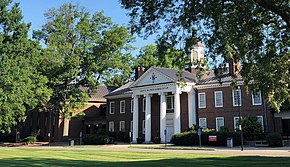This article has an unclear citation style. (February 2016) |
| University of Louisville Brandeis School of Law | |
|---|---|
 | |
| Parent school | University of Louisville |
| Established | 1846 |
| School type | Public |
| Parent endowment | |
| Dean | Melanie Jacobs |
| Location | Louisville, Kentucky, U.S. |
| Enrollment | 355 [citation needed] |
| USNWR ranking | 99th (2023)[1] |
| Website | louisville |
The University of Louisville Louis D. Brandeis School of Law, commonly referred to as The University of Louisville School of Law[2][3] or the Brandeis School of Law,[4] is the law school of the University of Louisville. Established in 1846, it is the oldest law school in Kentucky and the fifth oldest in the country in continuous operation.[5] The law school is named after Justice Louis Dembitz Brandeis, who served on the Supreme Court of the United States and was the school's patron. Following the example of Brandeis, who eventually stopped accepting payment for "public interest" cases,[6] Louis D. Brandeis School of Law was one of the first law schools in the nation to require students to complete public service before graduation.[7]
The school offers six dual-degree programs that allow students to earn an MBA, MSW, MA in humanities, M.Div. (with the Louisville Presbyterian Theological Seminary), MA in political science, and MUP in urban planning while attaining their J.D. These classes are offered in conjunction with other University of Louisville departments.
The school's law library contains 400,000 volumes as well as the papers of Louis D. Brandeis and John Marshall Harlan, both Supreme Court Justices and native Kentuckians. It is one of only thirteen Supreme Court repositories in the nation. The law school's flagship law review is the University of Louisville Law Review.[8]
According to University of Louisville's 2018 ABA-required disclosures, 92% of the Class of 2018 was employed within ten months of graduation. This includes 76% who obtained full-time, long-term, JD-required employment ten months after graduation, excluding solo practitioners.[9]

- ^ "Best Law School Rankings – Law Program Rankings – US News". Archived from the original on February 8, 2017. Retrieved March 28, 2014.
- ^ "Louisville School Of Law Provides Briefing Service". Middlesboro Daily News. October 20, 1934. p. 3.
- ^ "Lambert to speak at local Rotary meeting". Corbin Times Tribune. August 29, 2001. p. 5.
...from the University of Louisville School of Law in 1974.
- ^ "University of Louisville, Louis D Brandeis School of Law". Retrieved July 27, 2014.
- ^ University of Louisville Brandeis School of Law Guidebook (2009)
- ^ Klebanow, Diana, and Jonas, Franklin L. People's Lawyers: Crusaders for Justice in American History, M.E. Sharpe (2003)
- ^ Business First: "Law student's public service is bedrock aspect." Friday, March 10, 2006
- ^ "Home — Louis D. Brandeis School of Law". louisville.edu. Archived from the original on February 21, 2015. Retrieved June 19, 2018.
- ^ "Louisville ABA §509 Employment Data". University of Louisville. Archived from the original on March 19, 2022. Retrieved March 5, 2020.